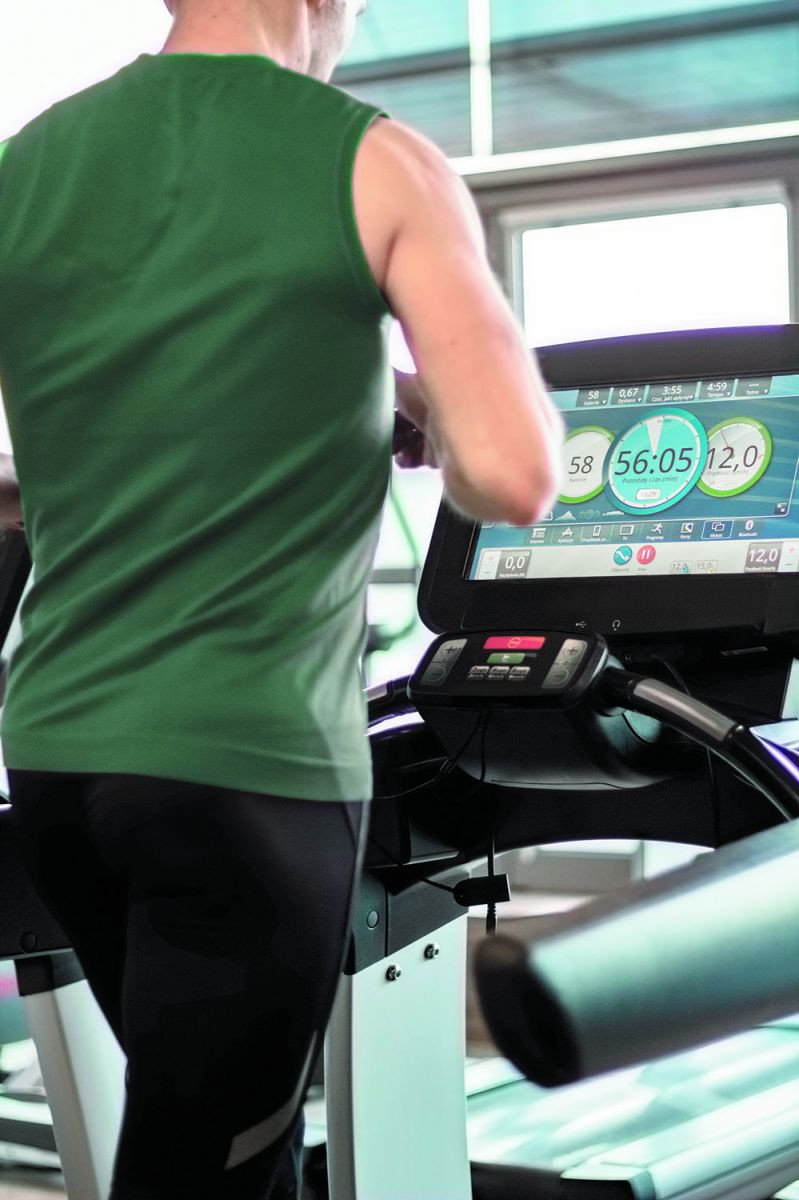
Counting steps is good — is combining steps and heart rate better?

Appendix pain: Could it be appendicitis?

Can saw palmetto treat an enlarged prostate?

How does Ozempic work? Understanding GLP-1s for diabetes, weight loss, and beyond

Zinc: What it does for the body, and the best food sources

Respiratory health harms often follow flooding: Taking these steps can help

Tips to leverage neuroplasticity to maintain cognitive fitness as you age

Can white noise really help you sleep better?

Celiac disease: Exploring four myths

What is prostatitis and how is it treated?
Exercise & Fitness Archive
Articles
As physical activity level rises, blood pressure may drop
Research we're watching
The more physically active you are, the lower your risk of high blood pressure, a study in the April 2017 issue of Hypertension suggests.
Researchers pooled data from 29 studies involving a total of more than 330,000 people, about 20% of whom had high blood pressure. They examined the association between high blood pressure and leisure-time physical activity (walking, dancing, or gardening, for example) as measured by metabolic equivalents (METs).
Take a swing at racket sports
Research suggests they may serve up great health benefits.
Image: © Mike Watson Images/Thinkstock
Want to live longer? Then pick up a racket. In a study published online Nov. 28, 2016, by the British Journal of Sports Medicine, researchers examined the link between certain sports and longevity and found that racquet sports came out on top.
"In many ways, racket sports like tennis, squash, badminton, racquetball, Ping-Pong, and other variations are the ideal exercise for many older men," says Vijay A. Daryanani, a physical therapist and personal trainer with Harvard-affiliated Spaulding Outpatient Center. "Besides offering a good cardiovascular workout, they can help with both upper- and lower-body strength at one time. They can be played at any age, can be modified to fit most fitness levels, and do not involve a lot of equipment."
What does it take to be a super-ager?
Research suggests that moving out of your comfort zone is the key to staying mentally and physically young.
Finding role models who are older than we are gets more difficult as we age. But in the last few years, medical science has identified a new group we can aspire to join — the super-agers. The term refers to people in their 70s and 80s who have the mental or physical capability of their decades-younger counterparts.
What makes a cognitive super-ager?
Dr. Bradford Dickerson, a neurologist at Harvard-affiliated Massachusetts General Hospital and his colleagues have been studying super-agers for several years. Their results suggest that embracing new mental challenges may be the key to preserving both brain tissue and brain function.
Should I drop calories or boost exercise?
Ask the doctor
Image: © udra/Thinkstock
Q. To lose weight, should I focus more on my calorie count or the amount of time I spend exercising?
A. It is very, very hard to lose weight without both watching your calories and regularly exercising. But it's not that simple. For years, doctors (including me) told patients: "You've got to burn off more calories through exercise than the calories that you eat. If you do that, you'll maintain a healthy weight." We even implied that not being able to maintain a healthy weight, since it was so simple, reflected a weakness of character.
The value of prevention
Treating heart disease is expensive. Adopting heart-healthy habits can save money as well as lives.
If you exercise, eat right, and follow other heart-friendly habits, you're probably less likely to end up in the hospital with a heart problem. And — no surprise here — that translates to far lower health care costs. The average hospital charge for a heart operation or related procedure is about $85,000 (see "The price of treating heart disease").
A recent report shed light on the magnitude of the savings realized from heart disease prevention strategies. The study, published in the Feb. 1, 2017, Journal of the American Heart Association, focused on Medicare claims for more than 6,200 people over age 65. Health care costs were about $5,000 less per year in people with the most heart-healthy factors compared with those with the least number of factors. If all Medicare beneficiaries followed five of seven key heart-healthy habits (see "Life's Simple 7") to reduce cardiovascular disease, it would save more than $41 billion a year in Medicare costs, the study authors estimated.
Is it possible for weekend warriors to get enough exercise?
On call
Image: © Nastco/Thinkstock
Q. I am an active person, but I exercise only on the weekends. Should I be concerned that all my exercise is concentrated over just two days ?
A. Regular exercise at any time is beneficial to your health. The rewards are related more to the amount of weekly exercise, and less to the type of workout or frequency. In fact, a recent study, which recorded self-reported exercise habits in more than 60,000 adults, found that weekend-only exercise had similar gains to regular daily exercise.
Get smart about treadmills
Treadmills are among the most effective types of exercise equipment — if you know how to use them.
Cardio exercise is essential for all-around health, but many older men have trouble hitting the recommended 150 minutes of moderate-intensity exercise per week. And some people may have limitations that prevent them from doing traditional cardio workouts like walking, running, or swimming.
But there may be another option: the standard gym treadmill.
Just 45 minutes of weekly activity may help with arthritis
In the journals
Studies have shown that regular activity can help older adults with arthritis stay independent. How much is enough? Research published online Dec. 28, 2016, by Arthritis Care & Research suggests you may need as little as 45 minutes per week.
Federal guidelines recommend 150 minutes of moderate activity per week to prevent premature death and serious illness. However, reaching that number is tough to reach for people with arthritis; in fact, only one in eight men with knee arthritis meet this standard. In this study, researchers tracked several years of fitness activity for 1,629 adults (44% of whom were men), ages 49 to 83, with osteoarthritis in the hip, knee, foot, or some combination. Specific exercises or activities were not recorded, only the time invested per week.
Sticking with your exercise program
Exercise shouldn't be something you do only when you want to drop those 10 extra pounds or prepare for the charity 10-kilometer run. To be successful, it should be something you do as routinely as eating, sleeping, and taking your morning shower. That can be difficult, as you may already know. The information below may help you stay on course when your motivation starts to flag. Remember, the result is worth the effort.
The value of maintaining an exercise program became evident when the results of the Harvard Alumni Health Study were published in the New England Journal of Medicine. The men who had been moderately active but later became sedentary had a 15% higher risk of death than their counterparts who had never been active. On the other hand, those who started and kept up an exercise program had a 23% lower risk of death, which approaches the 29% decrease in risk enjoyed by the men who'd always been active. But knowing the benefits of lifelong exercise or even creating a personal exercise plan will be of little use if you don't stick to your program. As you plan an exercise routine, you need to prepare for the challenges that await you, so you won't be thrown off track.
Walking movements may predict memory decline
In the journals
Previous research has suggested that slow walking speed might predict cognitive decline, but a recent study suggests how you walk also may provide clues. The results were published online Nov. 19, 2016, by the Journal of Alzheimer's Disease.
Researchers examined medical records of more than 3,400 people ages 70 to 89 who had completed both a neurological examination and gait analysis to measure walking movements like stride length, step count, cadence, stance time, and arm swings.

Counting steps is good — is combining steps and heart rate better?

Appendix pain: Could it be appendicitis?

Can saw palmetto treat an enlarged prostate?

How does Ozempic work? Understanding GLP-1s for diabetes, weight loss, and beyond

Zinc: What it does for the body, and the best food sources

Respiratory health harms often follow flooding: Taking these steps can help

Tips to leverage neuroplasticity to maintain cognitive fitness as you age

Can white noise really help you sleep better?

Celiac disease: Exploring four myths

What is prostatitis and how is it treated?
Free Healthbeat Signup
Get the latest in health news delivered to your inbox!
Sign Up









